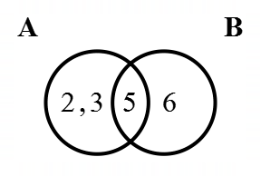11. What is the GCD according to the given Venn Diagram?


12. Which of the following factors account more to the cost of Chan's algorithm?
13. Which of the following is not a property of perfect graph?
14. How many times will the function fact() be called when the following code is executed?
int fact(int n)
{
if(n == 0)
return 1;
return n * fact(n - 1);
}
int main()
{
int n = 5;
int ans = fact(n);
printf("%d",ans);
return 0;
}
int fact(int n)
{
if(n == 0)
return 1;
return n * fact(n - 1);
}
int main()
{
int n = 5;
int ans = fact(n);
printf("%d",ans);
return 0;
}15. Recursive solution of tower of hanoi problem is an example of which of the following algorithm?
16. A matching M is maximal if and only if there exists no augmenting path with respect to M.
17. How many times will the function recursive_get_min() be called when the following code is executed?
#include<stdio.h>
#include<stdlib.h>
struct Node
{
int val;
struct Node* next;
}*head;
int min_of_two(int a, int b)
{
if(a < b)
return a;
return b;
}
int recursive_get_min(struct Node* temp)
{
if(temp->next == 0)
return temp->val;
return min_of_two(temp->val,recursive_get_min(temp->next));
}
int main()
{
int n = 5, arr[5] ={1,1,1,1,1},i;
struct Node *temp, *newNode;
head = (struct Node*)malloc(sizeof(struct Node));
head -> next =0;
temp = head;
for(i=0;i<n;i++)
{
newNode =(struct Node*)malloc(sizeof(struct Node));
newNode->next = 0;
newNode->val = arr[i];
temp->next =newNode;
temp = temp->next;
}
int min_num = recursive_get_min(head->next);
printf("%d",min_num);
return 0;
}
#include<stdio.h>
#include<stdlib.h>
struct Node
{
int val;
struct Node* next;
}*head;
int min_of_two(int a, int b)
{
if(a < b)
return a;
return b;
}
int recursive_get_min(struct Node* temp)
{
if(temp->next == 0)
return temp->val;
return min_of_two(temp->val,recursive_get_min(temp->next));
}
int main()
{
int n = 5, arr[5] ={1,1,1,1,1},i;
struct Node *temp, *newNode;
head = (struct Node*)malloc(sizeof(struct Node));
head -> next =0;
temp = head;
for(i=0;i<n;i++)
{
newNode =(struct Node*)malloc(sizeof(struct Node));
newNode->next = 0;
newNode->val = arr[i];
temp->next =newNode;
temp = temp->next;
}
int min_num = recursive_get_min(head->next);
printf("%d",min_num);
return 0;
}18. Consider the following algorithm of Karger's algorithm given below. Which of the following best suits the blank?
Let G=(V, E)
while (V > 2)
pick any edge e from E randomly
__________________________
remove self-loops
return the cut left with last 2 vertices
Let G=(V, E) while (V > 2) pick any edge e from E randomly __________________________ remove self-loops return the cut left with last 2 vertices
19. What is the result of the recurrences which fall under the extended second case of Master's theorem (let the recurrence be given by T(n)=aT(n/b)+f(n) and f(n)=nc(log n)k?
20. What will be the encrypted text corresponding to plain text "HELLO" using standard polybius square cipher?
Read More Section(Miscellaneous on Data Structures)
Each Section contains maximum 100 MCQs question on Miscellaneous on Data Structures. To get more questions visit other sections.
- Miscellaneous on Data Structures - Section 1
- Miscellaneous on Data Structures - Section 2
- Miscellaneous on Data Structures - Section 3
- Miscellaneous on Data Structures - Section 4
- Miscellaneous on Data Structures - Section 5
- Miscellaneous on Data Structures - Section 7
- Miscellaneous on Data Structures - Section 8
- Miscellaneous on Data Structures - Section 9
- Miscellaneous on Data Structures - Section 10
- Miscellaneous on Data Structures - Section 11
- Miscellaneous on Data Structures - Section 12
